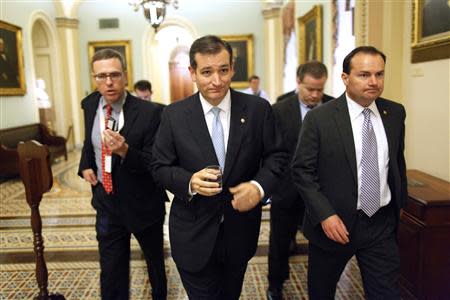Cruz put RNC in tight spot during shutdown

When Texas Republican Sen. Ted Cruz began his 21-hour speech on the Senate floor in protest of Obamacare, the Republican National Committee, seeing an opportunity to rally supporters and donors, quickly got behind him.
The party's website launched a Stand With Ted page to collect signatures, and RNC Chairman Reince Priebus penned a letter in support of the freshman lawmaker.
“In a fight between Harry Reid and Ted Cruz, I will stand with Ted Cruz any day,” Priebus wrote. “Today, Senator Cruz has taken the fight to defund ObamaCare to the Senate floor. I hope you will join me in standing with him in solidarity.”
Cruz had recently led a coalition of conservative lawmakers to persuade House GOP leaders to scrap their original plans and adopt his quixotic scheme to refuse to fund the government unless Obamacare was defunded. The government shut down for 16 days as a result.
Even after the shutdown began, the RNC continued to offer support for lawmakers who wanted to keep up the fight against Obamacare. But it had to do so without appearing to take sides when an internal spat broke out in the GOP over tactics. A group of Republicans who were growing disenchanted with the Cruz strategy wanted to strike a deal and reopen the government.
Sean Spicer, a spokesman for the RNC, told Yahoo News that the committee’s intention was to offer support for the opposition movement against the health care law but not to take sides on strategy.
“There was one goal that united all Republicans, which was to defund Obamacare,” Spicer told Yahoo News. “Our job was to provide support for that effort while it was going on without supporting a tactic.”
Not an easy needle to thread. By embracing Cruz — who became a symbol of GOP resistance against party leaders — the RNC risked being caught in the middle of a Republican debate over policy strategy, a position that party committees aren't built for.
"I've got to be the chairman for everybody," Preibus said in an Oct. 14 interview with The 405 Radio. "That means for Ted Cruz, that means for Mitch McConnell. ... I've got to keep a huge family together that doesn't agree all the time, but we know we agree on the main things."
There are a few reasons why the RNC would want to attach itself to Cruz, despite the risk. The first is practical. Love him or hate him, Cruz, a fresh face in the GOP, is the most dynamic thing the party has going for it right now. He has proved himself a star on the tea party speaking circuit; he’s a pro at getting media attention; and he’s a partisan fundraiser’s dream. National Republicans believed — correctly — that the most passionate supporters and donors would respond well to his cause.
“Parties are always chasing for the hot message of the day. They’re always looking for something that drives engagement,” veteran Republican strategist Rick Wilson told Yahoo News. “It’s not surprising” that the RNC would use Cruz's protest speech to raise money, he added.
Another reason the RNC latched on to Cruz could have to do with a deeper problem facing both parties: competition. As the Atlantic’s Molly Ball has reported, the past few years have seen an enormous growth in the rise of advocacy groups — particularly on the right — that in part are competing with official party committees over donations, volunteers and messaging. Many of these groups, most notably Heritage Action, the Club for Growth and FreedomWorks, take strict positions on conservative strategy, and they actively seek to punish lawmakers who don’t adopt their tactics.
Promoting Cruz during his moment in the spotlight gave the RNC an opportunity to offer an olive branch to tea party elements within the party and prove it still had the resolve to fight Obamacare. At the time, Cruz was the highest-profile fighter against the health care law, but there was little indication that he would become a lightning rod that would temporarily divide the party.
Now that the shutdown is over, an experience Republicans look back on with mixed emotions, the RNC is not distancing itself from Cruz.
“We embrace him,” Spicer said in an interview Thursday with Al-Jazeera. “What Ted Cruz and a lot of his members did is frankly respond to what the American people and their districts and their states want them to be talking about. I think they’ve seen people in Washington walking lockstep, saying, 'Let’s make deals, let’s increase the debt ceiling.' I think what Ted Cruz and a lot of our members in the House are doing is responding to what constituents and people outside the Beltway are actually talking about.”


